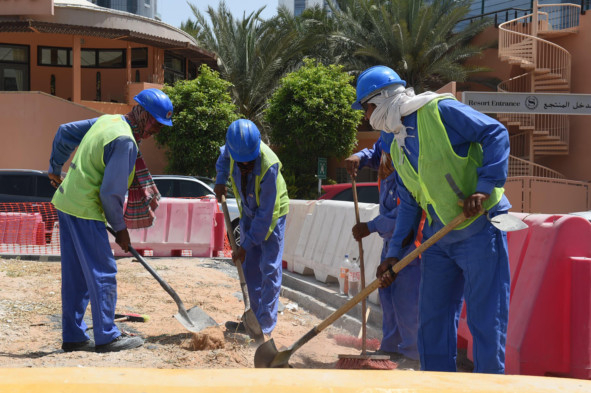
Abu Dhabi: Abu Dhabi Municipal officials on Wednesday asked contracting companies to protect workers from summer heat and avoid prolonged exposure to sun.
Extra precautions also need to be taken this year as the coming Ramadan will present some of the most gruelling operating hours of the year for outdoor workers, they said.
“The hottest period of the year in the UAE is once again coinciding with Ramadan, and we want to increase awareness among contractors so that they protect worker health,” Dr Huda Alsalmi, head of environment, health and safety at the Municipality of Abu Dhabi City told Gulf News.
She was speaking on the sidelines of an awareness session about heat illness organised by the Department of Municipal Affairs and Transport (DMAT), which regulates municipal activities in the capital.
Managers from the construction industry reported that certain firms still continue outdoor work in a discrete manner during midday, which is banned in the UAE between June 15 and September 15. “It is not at all ethical to force workers to suffer in the midday heat, and we will therefore continue to conduct regular checks on worksites during the holy month,” Dr Alsalmi said.
Ramadan is expected to begin this year on June 6, while the midday break that bans outdoor work under the sun between 12.30pm and 3pm will start from June 15. During the peak summer season, temperatures can reach nearly 50 degree Celsius in some parts of the country. For the last 12 years, the Ministry of Human Resources and Emiratisation have been enforcing the midday break during summer.
When working under the sun, individuals are recommended to drink a 200 millilitres of water every 20 minutes. They must also replace lost electrolytes by adding salt and lemon, or consume electrolyte solutions.
“This year, it means that workers must remember to drink enough water before they begin their fast, and also consume enough once they end it in order to ensure that they do not fall ill,” Dr Alsalmi said
A number of companies also prefer to shift work to the evening hours, when workers are not fasting, and officials said that this too can be a viable alternative.
Mohammad Ali, product executive at pharmaceutical distributor National Trading and Pharmaceutical Establishment, said the biggest risks of outdoor work in the heat are dehydration, as well as hyponatremia, which occurs when sodium level in the blood dips, causing nausea, confusion and muscle weakness.
“Before a heat stroke, workers can even forget their own names or sense of place. So they should not ignore any signs of thirst while not fasting, and drink enough fluids to sustain them during the fast,” Ali recommended.
For the last few years, nearly 99 per cent of companies have complied with the midday break regulations. As reported by Gulf News last week, only 58 violations were noted by inspectors in 2015. However, in a number of cases, outdoor workers still do not rehydrate as they are afraid that frequent trips to the washroom will prevent them from meeting their deadlines.
“In such instances, it is the worksite supervisors who must be careful. They must ensure that workers do not feel so overburdened that they do not take care of their own health,” Ali said.
The DMAT, along with the ministry, conducts a number of awareness sessions to prevent heat-related incidents, while also undertaking regular inspections on worksites every month.












